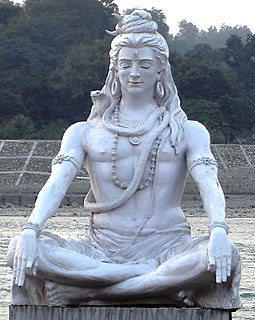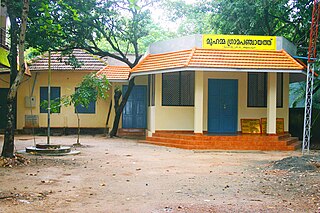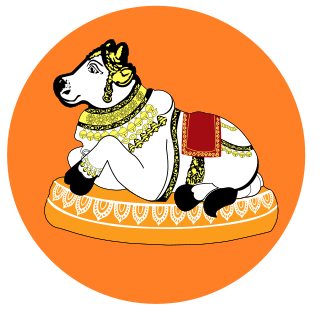
India, officially the Republic of India, is a country in South Asia. It is the seventh-largest country by area, the second-most populous country, and the most populous democracy in the world. Bounded by the Indian Ocean on the south, the Arabian Sea on the southwest, and the Bay of Bengal on the southeast, it shares land borders with Pakistan to the west; China, Nepal, and Bhutan to the north; and Bangladesh and Myanmar to the east. In the Indian Ocean, India is in the vicinity of Sri Lanka and the Maldives; its Andaman and Nicobar Islands share a maritime border with Thailand, Myanmar and Indonesia.

Indira Priyadarshini Gandhi was an Indian politician and a central figure of the Indian National Congress. She was the 3rd prime minister of India and was also the first and, to date, only female prime minister of India. Gandhi was the daughter of Jawaharlal Nehru, the 1st prime minister of India. She served as prime minister from January 1966 to March 1977 and again from January 1980 until her assassination in October 1984, making her the second longest-serving Indian prime minister after her father.
Jainism is an ancient Indian religion. The three main pillars of Jainism are ahiṃsā (non-violence), anekāntavāda (non-absolutism), and aparigraha (ascetism).

Jawaharlal Nehru was an Indian anti-colonial nationalist, secular humanist, social democrat and author who was a central figure in India during the middle of the 20th century. Nehru was a principal leader of the Indian nationalist movement in the 1930s and 1940s. Upon India's independence in 1947, he served as the country's prime minister for 17 years. Nehru promoted parliamentary democracy, secularism, and science and technology during the 1950s, powerfully influencing India's arc as a modern nation. In international affairs, he steered India clear of the two blocs of the Cold War. A well-regarded author, his books written in prison, such as Letters from a Father to His Daughter (1929), An Autobiography (1936) and The Discovery of India (1946), have been read around the world.

Mohandas Karamchand Gandhi was an Indian lawyer, anti-colonial nationalist and political ethicist who employed nonviolent resistance to lead the successful campaign for India's independence from British rule, and to later inspire movements for civil rights and freedom across the world. The honorific Mahātmā, first applied to him in 1914 in South Africa, is now used throughout the world.

Siva, also known as Mahadeva, is one of the principal deities of Hinduism. Lord Siva is said to be the deity of death and time. In Sanskrit language, kālá means time. He is the Supreme Being in Shaivism, one of the major traditions within Hinduism.

West Bengal is a state in the eastern region of India along the Bay of Bengal. With over 91 million inhabitants, it is the fourth-most populous state and the fourteenth-largest state by area in India. Covering an area of 88,752 km2 (34,267 sq mi), it is also the eighth-most populous country subdivision of the world. Part of the Bengal region of the Indian subcontinent, it borders Bangladesh in the east, and Nepal and Bhutan in the north. It also borders the Indian states of Odisha, Jharkhand, Bihar, Sikkim and Assam. The state capital is Kolkata, the third-largest metropolis, and seventh largest city by population in India. West Bengal includes the Darjeeling Himalayan hill region, the Ganges delta, the Rarh region and the coastal Sundarbans. The state's main ethnic group are the Bengalis, with the Bengali Hindus forming the demographic majority.

Swami Vivekananda, born Narendranath Datta, was an Indian Hindu monk and philosopher. He was a chief disciple of the 19th-century Indian mystic Ramakrishna. Influenced by Western esotericism, he was a key figure in the introduction of the Indian darsanas of Vedanta and Yoga to the Western world, and is credited with raising interfaith awareness, bringing Hinduism to the status of a major world religion during the late 19th century. He was a major force in the contemporary Hindu reform movements in India, and contributed to the concept of nationalism in colonial India. Vivekananda founded the Ramakrishna Math and the Ramakrishna Mission. He is perhaps best known for his speech which began with the words "Sisters and brothers of America ...," in which he introduced Hinduism at the Parliament of the World's Religions in Chicago in 1893.

Avul Pakir Jainulabdeen Abdul Kalam was an Indian aerospace scientist who served as the 11th president of India from 2002 to 2007. He was born and raised in Rameswaram, Tamil Nadu and studied physics and aerospace engineering. He spent the next four decades as a scientist and science administrator, mainly at the Defence Research and Development Organisation (DRDO) and Indian Space Research Organisation (ISRO) and was intimately involved in India's civilian space programme and military missile development efforts. He thus came to be known as the Missile Man of India for his work on the development of ballistic missile and launch vehicle technology. He also played a pivotal organisational, technical, and political role in India's Pokhran-II nuclear tests in 1998, the first since the original nuclear test by India in 1974.

Sikkim is a state in northeastern India. It borders the Tibet Autonomous Region of China in the north and northeast, Bhutan in the east, Province No. 1 of Nepal in the west, and West Bengal in the south. Sikkim is also close to India's Siliguri Corridor near Bangladesh. Sikkim is the least populous and second smallest among the Indian states. A part of the Eastern Himalaya, Sikkim is notable for its biodiversity, including alpine and subtropical climates, as well as being a host to Kangchenjunga, the highest peak in India and third highest on Earth. Sikkim's capital and largest city is Gangtok. Almost 35% of the state is covered by the Khangchendzonga National Park – a UNESCO World Heritage Site.

Shivaji Bhonsale I, also referred to as Chhatrapati Shivaji, was an Indian ruler and a member of the Bhonsle Maratha clan. Shivaji carved out an enclave from the declining Adilshahi sultanate of Bijapur that formed the genesis of the Maratha Empire. In 1674, he was formally crowned the Chhatrapati of his realm at Raigad Fort.
The Hindu calendar, Panchanga or Panjika is one of various lunisolar calendars that are traditionally used in the Indian subcontinent and Southeast Asia, with further regional variations for social and Hindu religious purposes. They adopt a similar underlying concept for timekeeping based on sidereal year for solar cycle and adjustment of lunar cycles in every three years, however also differ in their relative emphasis to moon cycle or the sun cycle and the names of months and when they consider the New Year to start. Of the various regional calendars, the most studied and known Hindu calendars are the Shalivahana Shaka found in the Deccan region of Southern India, Vikram Samvat (Bikrami) found in Nepal, North and Central regions of India – all of which emphasize the lunar cycle. Their new year starts in spring. In regions such as Tamil Nadu and Kerala, the solar cycle is emphasized and this is called the Tamil Calendar and Malayalam calendar and these have origins in the second half of the 1st millennium CE. A Hindu calendar is sometimes referred to as Panchangam (पञ्चाङ्ग), which is known also known as Panjika in Eastern India.

The Gupta Empire was an ancient Indian empire which existed from the early 4th century CE to late 6th century CE. At its zenith, from approximately 319 to 467 CE, it covered much of the Indian subcontinent. This period is considered as the Golden Age of India by historians. The ruling dynasty of the empire was founded by the king Sri Gupta; the most notable rulers of the dynasty were Chandragupta I, Samudragupta, and Chandragupta II, also known as Vikramaditya. The 5th-century CE Sanskrit poet Kalidasa credits the Guptas with having conquered about twenty-one kingdoms, both in and outside India, including the kingdoms of Parasikas, the Hunas, the Kambojas, tribes located in the west and east Oxus valleys, the Kinnaras, Kiratas, and others.

Odisha, formerly Orissa, is an Indian state located in Eastern India. It is the 8th largest state by area, and the 11th largest by population. The state has the third largest population of Scheduled Tribes in India. It neighbours the states of West Bengal and Jharkhand to the north, Chhattisgarh to the west, Andhra Pradesh to the south. Odisha has a coastline of 485 kilometres (301 mi) along the Bay of Bengal. The region is also known as Utkala and is mentioned in India's national anthem, "Jana Gana Mana". The language of Odisha is Odia, which is one of the Classical Languages of India.

The Maratha Empire or Maratha Confederacy was a early modern era confederacy that dominated a large portion of the Indian subcontinent in the 18th century. The empire formally began in 1674 with the coronation of Shivaji as the Chhatrapati. The rule of Marathas officially ended in 1818 with the defeat of Peshwa Bajirao II at the hands of the British East India Company. The Marathas are credited for ending Mughal Rule over most of the Indian subcontinent.

Mohiniyattam,, is an Indian classical dance form that developed and remained popular in the state of Kerala. Kathakali is another classical dance form of Kerala. Mohiniyattam dance gets its name from the word Mohini – a historical enchantress avatar of the Hindu god Vishnu, who helps the good prevail over evil by developing her feminine powers.

Kashmiris are a Dardic ethno-linguistic group and first-language speakers of the Kashmiri language, living mostly, but not exclusively, in the Kashmir Valley in the portion of the disputed Kashmir region administered by India.

Panchayati Raj is the system of local self-government of villages in rural India as opposed to urban and suburban municipalities.

A Jyotirlinga or Jyotirlingam, is a devotional representation of the Hindu god Shiva. The word is a Sanskrit compound of jyotis 'radiance' and linga. Śiva Mahāpurāṇa mentions 64 original Jyotirlinga shrines in India and Nepal, 12 of which are most sacred and they are called the Maha Jyotirlingam.
















